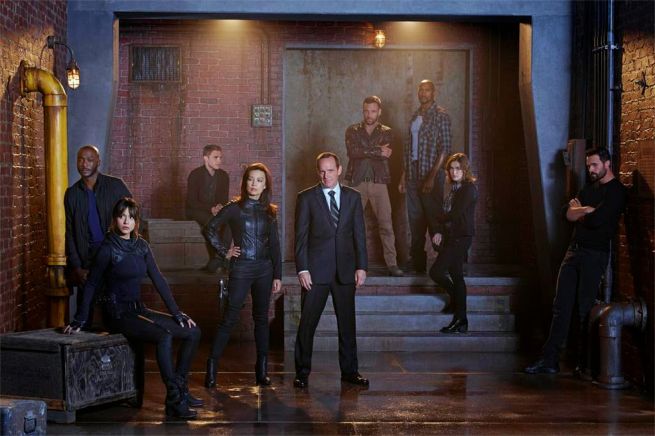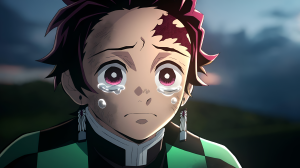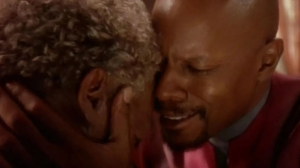
Last week, I stayed up way past my bedtime to speak to Jeffrey Bell, show runner on Marvel’s Agents of S.H.I.E.L.D. I’m in the UK, he’s in California, but it was more than worth the wait. We chatted for a good long while, all about S.H.I.E.L.D., about its place in the Marvel universe, and also about how Agent Carter is going to fit in when it takes over the Tuesday night slot from S.H.I.E.L.D. down the line a little.
Videos by ComicBook.com
I started by trying to get some idea of just what Bell’s role in the show really is, behind the title and then we were off to the races.
Brendon Connelly: Jeff, tell me. Who’s your boss? Who do you answer to? And then, who answers to you?
Jeff Bell: Really, it’s me Jed and Maurissa, supervising all of the creative decisions. Last year, before Joss was doing Avengers he was part of that and we pitched to him, but he’s busy with Avengers now, though he knows what we’re doing. Now it’s us taking what we’re doing to Marvel and ABC and saying “This is what we think is cool.” Mostly they say “Yay, we think that’s cool too.”
Everybody else answers to us. There’s a writer’s room we put together, a total of ten bodies in a couple of writing teams. We work collaboratively to work out the stories. Then I have a line producer, Gary Brown, who works out the physical production.
Jeph Loeb is really our point person at Marvel. He’s the head of TV there, and he writes as well, he’s been a great creative partner. He’s usually the first person we speak to about any creative stuff.
Marvel is complicated in that we’re part of the Marvel Cinematic Universe, and so after Mr. Loeb we’ll run it through New York, Joe Quesada, Dan Buckley and those guys. We pitch our stuff to Kevin Feige and his movie group to see if there’s something we can tie into, to see if they’re okay about us using a character, or a weapon or some other cool thing.
Everything is interconnected, and that’s really what we have to pay the most attention to. It’s challenging but fun as we try to lace some Easter egg in, something that ties into a movie or, if not, at least the comics so fans can find those little things that nobody else knows about.
BC: So what can you do that Jed and Maurissa can’t? How does the show benefit because you’re part of the team?
JB: Jed and Maurissa had never run a show, and running a show is more than just telling cool stories. It’s political. It’s hiring, having relationships so you can hire good writing staff, it’s knowing who to hire for producers, for your production crew. It’s navigating the politics of studios and networks. Sadly, writing is just part of it. Writing is the creative part, but it’s not everything, and they hadn’t done everything else. My job is to help them learn how to do that, to steer the ship while they learn. They’re both super talented, super smart people and now we, as much as we can, divide and conquer. If the three of us never slept we still wouldn’t be able to get everything done as well as we’d like to get it done.
BC: It’s obviously a massive undertaking. I’m assuming that, for you, there is no hiatus between seasons and it’s pretty much an ongoing thing. Is that a fair assumption?
JB: Yeah. We technically had two weeks between finishing the first season and bringing everybody back for the second season.
BC: And in that two weeks, what was on your mind?
JB: Why am I doing jury duty for four days’ truly. The challenge of doing 22 episodes of network is that there’s little time to recharge the batteries. But here’s what’s fun about it: as a writer, if you like filmmaking, TV is the place to be right now. It’s all here. When I came out of film school I wanted to make indie films but those don’t really exist any more.
I got into television where I found that I wrote something, then I was in casting, then I worked with props, then I was on set, then I worked in post and the music. If you like all of that, TV is the place to be. And it’s the collaboration of that which makes it possible to happen as fast as it does. That’s one of the big differences between the US model and the European model. I’ve been talking to the big European groups about this, because they’re interested in trying to create the American model over there.
On British TV it’s one writer who, mostly, is supervising if not writing all of it and that’s why there’s just six or eight episodes. We do 22 and that would be physically impossible. We put together a team of people, set Due North for everybody and then, riffing off of that, head out and get done what would take a single person a long time to do.
While one person is writing a script, I can have two of us break other stories so I can have, in theory, a story broken every couple of weeks. That’s the only way we can get ahead of the production train, because we shoot a new episode every eight days. If there’s a story that I, Jed and Maurissa like we say ‘Yes,’ that writer goes off and writes their outline, we give them notes, they write a script and then we send this to network and get their notes, then get production feedback on what we can and cannot do, that writer then goes off and is on set producing the episode, and if they have questions, they call us because we can’t be everywhere at once.
I love music but I’m not a musician, so I’d always imagined what it would be like to be in a band when you’re riffing and so, in the writer’s room, when people are riffing, that’s pretty exciting. You feel like Neo when all of the ones and zeroes fall into place, and everybody sees the same story. Every move we make happens because of this collaborative process.
BC: Now, as you set your compass and you think about that overall arc of a season and where you’re going, how late in the day do you sometimes recalibrate that? I know that the narrative in the media about season one was that the story in the back nine was in your mind up front, but I’m pretty sure you must have changed direction at some point, at least to some extent.
JB: Simply, because we’re working with Marvel movies we knew that Hydra were going to be revealed in Captain America 2. We weren’t allowed to say Hydra. We weren’t allowed to say the H word, as we referred to it, at all. We couldn’t check that at all. We couldn’t even have squirrelly, suspicious double agent people in S.H.I.E.L.D. because that would set up that notion. We knew that was happening, and we knew the release date so we knew it was happening around episode 15, 16 or 17. We didn’t know specifically which week, at first, and we knew that after episode ten we were going to go off for a little bit then come back. You build towards certain targets. We knew from the beginning that if half of S.H.I.E.L.D. was Hydra, it’d be disingenuous for us to not have somebody on our team be Hydra.
BC: From day one? Grant Ward was Hydra in your minds from the very beginning?
JB: From day one he was Hydra in our minds. Now, if that had not worked out, and we felt like he couldn’t have accomplished that, if we felt like we needed other options, we could have changed.
Here’s an example of changing. We didn’t know we were going to fall in love with Ruth Negga the way we did as Raina. She came in for episode five but we thought ‘She’s cool’ and so we brought her back. So what would have been somebody else became her, and as we fell in love with her character, we wrote more and more to that.
We knew J. Richards was going to be Deathlok but we didn’t know we were going to care about him as much as we did. When you have actors like that, that you really like, you start writing to them.
One of the things with Brett was that we thought he could pull this off, this squeaky-clean square guy. We started building him and set up, “There’s a wild card on the plane so I become her s.o; the most dangerous person on the plane is May so I’ll sleep with her; how do I endear myself to everybody? I jump out of the plane and save someone, and I have a parachute so if I fail I’m still fine.” And he goes through this list and does all that.
We knew the kind of person we wanted to bring in as The Clairvoyant and we knew we wanted a mislead so we brought in Victoria Hand. The fact that Bill Paxton worked out was fantastic. You’re going to write that character in a certain way because of who the actor is, so that changes, but we did know we were going to introduce The Clairvoyant, that we were going to introduce he was Hydra and then use that to reveal Ward. Those were things we knew loosely. When they were going to happen had to shift because of our schedule, but you set tentpoles and walk towards them. When something doesn’t work, you steer away from it; when you have an opportunity, you steer into it. It’s fun because you have the big arc but you don’t know how… it’s like, I look out of my window a big building a couple of miles away, I know I want to get there but I don’t know the neighborhoods I’ll walk through on the way.
BC: So knowing what Joss is doing in Age of Ultron, do you feel restricted? Has he set some of your architecture out for you? And how does it feel, knowing that’s coming?
JB: It’s super exciting. Look, the Marvel movie universe is fantastic. We were sort of conceived to tell stories within that, and what we do well in television is different to what the movies can do well. Our challenge last season was, of our six characters, five of them were new to people, not from the MCU. What’s cool this year is that our characters are getting their own comics, they’re becoming a part of things, and people care about them.
Age of Ultron is coming up and we know what’s going on with that and look forward to seeing it, but it’s pretty cool to find ways to tie-in stuff and connect things. As Jeph Loeb would say, it’s unprecedented what we did with Cap 2, taking our show and blowing it up.
BC: And you’ve got that other, fixed part of the architecture hanging over you which is that, at some point, the season will end and, I presume, you don’t yet know and you won’t know for a while if that has to be the end or not, the series finale. The way you’ve got it arced out now, could the end of this season be the end of it all? Would that work?
JB: You never want it to end sooner rather than later. We know how this season is going to end, and if we need to calibrate it… well, if it ends, that means people didn’t love the show, which is sad for many reasons. We’d have a satisfying end to the season but we could make it a satisfying end to the series as much as any series finale is satisfying. Honestly, though, we’re not thinking of it as a series finale as much as a season finale. Let’s be glass half full guys today.
BC: As a viewer, every show I’d want to keep going always feels like there’s a shadow hanging over it.
JB: I know, and I hate the way a lot of networks do it. I feel sometimes that if the network would say “Yes, we’re picking it up again,” people would go “Thank god, I can keep watching it.” If you don’t know the show is coming back, you can feel like you don’t want to care. But here, with season two, I think we have some momentum coming in and I think we pick up on it. I’m optimistic that we can keep the plane in the air a little longer.
BC: What potential does this big break in the middle give you, when you hand over to Agent Carter?
Here’s what it does. One of our challenges last year was to produce 22 episodes that aired over, what, 40 weeks? 36 weeks? Something like that. And the age of re-runs is dead. Re-runs are death, and so you’re trying to commit to the habit of the show and they tune in to something else or a re-run and they’ll get pissed off. They’ll go away. What this allows us to do is minimize repeats. We’re showing ten episodes, and there has to be a gap or two because it’s physically impossible to produce ten shows and get through post production in time, we can’t do that so there’s going to be a Marvel special at some point. But pretty much every week you’re showing up and we’re there, and then instead of a repeat showing up mid-run and losing momentum, Agent Carter comes in and has its own cool stuff, and they’re running eight weeks in a row, then we can come back and run twelve in a row with no interruptions. We’re still producing our show every week but it just gives us time, barely, to finish 22 on schedule. It takes out the need for repeats in the back half – which is good for America, and good for the world.
I know that last year we started here in September but it didn’t start at the same time in England, did it?
BC: Don’t even talk to me about how it was murdered by the British network. They killed it.
JB: Really?
BC: Yes, because this country doesn’t accept breaks in programming. They tried it, even though they started late. It’s going to kill any show here. You have to start and you have to run weekly, unless its the Olympics or something. Even one of our longer-season shows like Doctor Who will typically run thirteen episodes unbroken. If the show’s not there, people will either think it’s cancelled or nor back for a year or something.
But I’m interested in this gap. Do you think you can you leverage that gap narratively?
JB: Yes. When we know when we’re going off, we can try to build to a cliffhanger so everybody is sitting there going “Oh my god, what happened.” We’re hoping that when we go off after ten episodes you’ll be going “Holy s**t. Really? And I have to wait how long? Curse them!”
BC: Will it help people who are really into your show to watch Agent Carter? When you go off and the audience watch Agent Carter and they think it’s something different, is the experience somehow going to be tied?
JB: Well… that’d be cool wouldn’t it?
BC: I get it. Okay.
JB: Well, their story is set in 1944 or something. Here’s what I think is interesting. Agent Carter seems to be about SSR pre-S.H.I.E.L.D., but about the beginnings of something, and the basic values of that. S.H.I.E.L.D. got blown up last year and what Coulson always wanted was a return to basics, and it gives us an opportunity to return to some of those core values and even physically, some of that SSR stuff has a way of finding its way into our show that could be cool. Anyway we can tie things together, we’re going to try to do it, but it is hard when the stories are 60 years apart.
BC: Sure. Cold cases. Lost files. Hunky super-soldiers on ice. You could do all sorts of things. It’s Marvel, there’s no end to the possibilities.
What else would you like to do? Are you going to walk away from TV at some point? Or is this the new ambition?
JB: Right now I’ve got a sweet gig running this thing, you know?
BC: But that young indie filmmaker in you, he doesn’t want to come back out again?
JB: That guy is still there. A lot of that is sated in this show, and on other shows, like Angel where I also directed. Right now, this is just too big for me to do that, but there are other shows behind this, and more ideas I have, and like all of us, we all like to tell stories, and one of the things that’s nice about this is that while, on the one hand, it’s a big Marvel spy show, on the other hand, like other stuff Joss has made, it’s really about family and people and feelings and there’s a lot of room for us to tell those stories as well.
BC: And that’s still the theme next year? Family and connectedness?
JB: [Long exhale] You know… [Pause] What we always look for are the human elements in the big story. That’s what television does well, it makes you care about people, and whether it’s literal family or anytime you have a team of people working together, it takes on some sort of family metaphor. Some of those teams are more dysfunctional than others, but it’s fun to explore.
BC: And there’s been some announcements about literal family too, so we do know a little bit about that.
JB: I… I have no idea what you’re talking about.
BC: Yeah, you do. Thank you very much, Jeff. Talk to you next time.
Agents of S.H.I.E.L.D. season one was released on DVD and Blu-ray this week. Season two starts on ABC on Tuesday September 23rd. That gives you just two weeks to revisit, so on your marks, get set…








